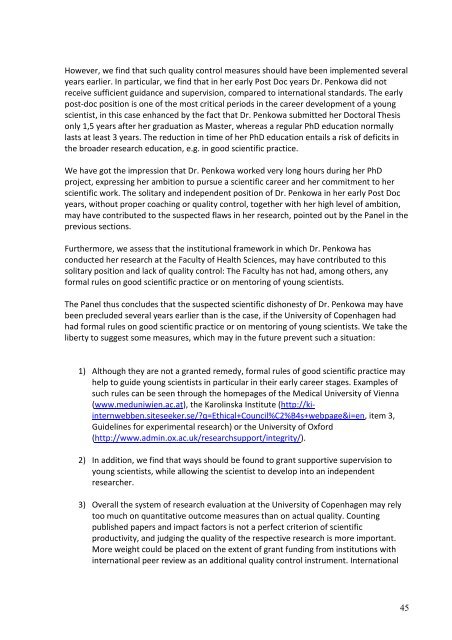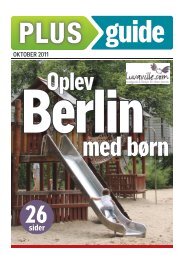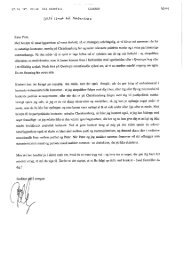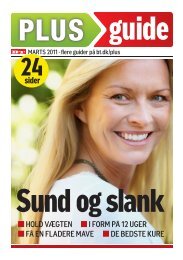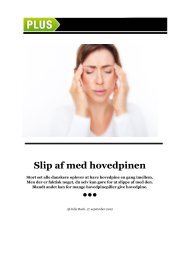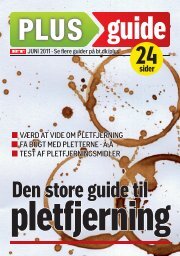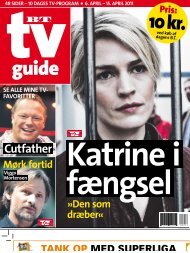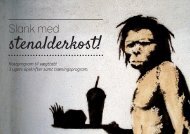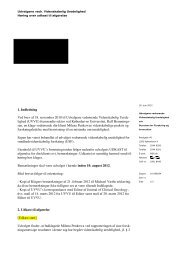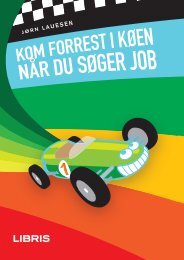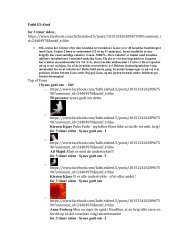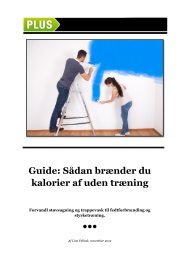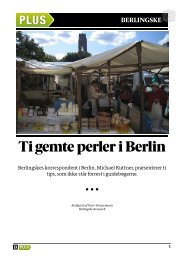Investigation into the research of Milena Penkowa - Nyheder
Investigation into the research of Milena Penkowa - Nyheder
Investigation into the research of Milena Penkowa - Nyheder
Create successful ePaper yourself
Turn your PDF publications into a flip-book with our unique Google optimized e-Paper software.
However, we find that such quality control measures should have been implemented several<br />
years earlier. In particular, we find that in her early Post Doc years Dr. <strong>Penkowa</strong> did not<br />
receive sufficient guidance and supervision, compared to international standards. The early<br />
post-doc position is one <strong>of</strong> <strong>the</strong> most critical periods in <strong>the</strong> career development <strong>of</strong> a young<br />
scientist, in this case enhanced by <strong>the</strong> fact that Dr. <strong>Penkowa</strong> submitted her Doctoral Thesis<br />
only 1,5 years after her graduation as Master, whereas a regular PhD education normally<br />
lasts at least 3 years. The reduction in time <strong>of</strong> her PhD education entails a risk <strong>of</strong> deficits in<br />
<strong>the</strong> broader <strong>research</strong> education, e.g. in good scientific practice.<br />
We have got <strong>the</strong> impression that Dr. <strong>Penkowa</strong> worked very long hours during her PhD<br />
project, expressing her ambition to pursue a scientific career and her commitment to her<br />
scientific work. The solitary and independent position <strong>of</strong> Dr. <strong>Penkowa</strong> in her early Post Doc<br />
years, without proper coaching or quality control, toge<strong>the</strong>r with her high level <strong>of</strong> ambition,<br />
may have contributed to <strong>the</strong> suspected flaws in her <strong>research</strong>, pointed out by <strong>the</strong> Panel in <strong>the</strong><br />
previous sections.<br />
Fur<strong>the</strong>rmore, we assess that <strong>the</strong> institutional framework in which Dr. <strong>Penkowa</strong> has<br />
conducted her <strong>research</strong> at <strong>the</strong> Faculty <strong>of</strong> Health Sciences, may have contributed to this<br />
solitary position and lack <strong>of</strong> quality control: The Faculty has not had, among o<strong>the</strong>rs, any<br />
formal rules on good scientific practice or on mentoring <strong>of</strong> young scientists.<br />
The Panel thus concludes that <strong>the</strong> suspected scientific dishonesty <strong>of</strong> Dr. <strong>Penkowa</strong> may have<br />
been precluded several years earlier than is <strong>the</strong> case, if <strong>the</strong> University <strong>of</strong> Copenhagen had<br />
had formal rules on good scientific practice or on mentoring <strong>of</strong> young scientists. We take <strong>the</strong><br />
liberty to suggest some measures, which may in <strong>the</strong> future prevent such a situation:<br />
1) Although <strong>the</strong>y are not a granted remedy, formal rules <strong>of</strong> good scientific practice may<br />
help to guide young scientists in particular in <strong>the</strong>ir early career stages. Examples <strong>of</strong><br />
such rules can be seen through <strong>the</strong> homepages <strong>of</strong> <strong>the</strong> Medical University <strong>of</strong> Vienna<br />
(www.meduniwien.ac.at), <strong>the</strong> Karolinska Institute (http://kiinternwebben.siteseeker.se/?q=Ethical+Council%C2%B4s+webpage&i=en,<br />
item 3,<br />
Guidelines for experimental <strong>research</strong>) or <strong>the</strong> University <strong>of</strong> Oxford<br />
(http://www.admin.ox.ac.uk/<strong>research</strong>support/integrity/).<br />
2) In addition, we find that ways should be found to grant supportive supervision to<br />
young scientists, while allowing <strong>the</strong> scientist to develop <strong>into</strong> an independent<br />
<strong>research</strong>er.<br />
3) Overall <strong>the</strong> system <strong>of</strong> <strong>research</strong> evaluation at <strong>the</strong> University <strong>of</strong> Copenhagen may rely<br />
too much on quantitative outcome measures than on actual quality. Counting<br />
published papers and impact factors is not a perfect criterion <strong>of</strong> scientific<br />
productivity, and judging <strong>the</strong> quality <strong>of</strong> <strong>the</strong> respective <strong>research</strong> is more important.<br />
More weight could be placed on <strong>the</strong> extent <strong>of</strong> grant funding from institutions with<br />
international peer review as an additional quality control instrument. International<br />
45


